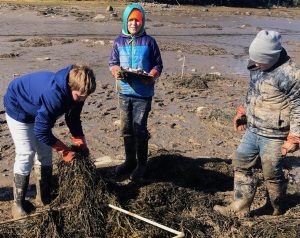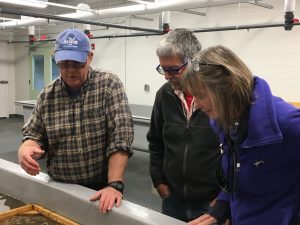by Bill Zoellick and Sarah Hooper
Other than Thursday, which was all about power outages and trees coming down, last week we worked with teachers and partners to set up community-based science programs for this year. The programs involve students at all five schools in our local school district, RSU 24, which stretches from Steuben all the way up to Eastbrook. The students are working with Gouldsboro shellfish warden Mike Pinkham and regional Maine Department of Marine Resources (DMR) scientists to “dig into” questions about green crabs and clams. As Gouldsboro moves toward more efficient ways to maintain productivity in a changing fishery, it needs to understand its options. Schoodic Institute helps RSU 24 teachers and students do the scientific work required to build that understanding.
Students’ Reflections on Mud and Science
Two weeks ago, students spent a day catching crabs that they will count and measure. Once they were back in their classrooms, teachers asked students to write down their reflections about the day. This last Tuesday we got together with RSU 24 science teachers to finalize plans for the rest of the school year. We began by looking at those student reflections.

One of the things that jumped out from the students’ reflections was that they took the work they did on the clam flat seriously and had a lot to say about it. For many of them, being out on a clam flat was a new experience. So, they wrote about the mud, how it smelled like the ocean and how it made walking hard. They also reflected on how they had worked together as teams. Some students reported that their team worked together well. In other cases, students talked about how, next time, they would do things differently. This coming week, as Sarah begins working with students in each school, she will start by helping them develop their thinking about what is involved in good, effective teamwork that is also fun. They will look at how science is fundamentally collaborative and consider how a team is stronger because people bring different abilities. One of the great things about the programs we are developing with RSU 24 is that students will work in teams on project-based science again and again as they move from middle school to high school. We want to help each of them develop a sense of his or her own strengths and voice when working with others.
Students also wrote about their desire to collect good data so that the DMR and town could really use it. A number of them were concerned because they felt sure that they had not found ALL the crabs in the seaweed plots assigned to them. From our perspective as educators, it was wonderful to see this question emerge. It provides a good starting place for discussions over the next weeks about how to compare crab densities between seaweed patches at different tidal positions, or of different sizes, without having to capture every crab. This is another nice example of what our program is all about. We aim to get students thinking about the “how” of science, not just the “what,” while they also collect data that is useful beyond the classroom.
Science and Overwintering Clams
For the past few years, Gouldsboro has been purchasing “seed clams” from the hatchery at the Downeast Institute (DEI). The seed clams are placed on clam flats in the spring and protected from crabs with nets to bring “dead mud” back to productivity. But purchasing hatchery clams is expensive. The town has ways to capture a portion of the millions of tiny wild clams that settle into the bays and coves each year, but capturing them is not the whole story. Once the town has tens of thousands of seed clams in the fall, it needs a way to keep them alive over the winter for use the following spring.
So, the two of us accompanied shellfish warden Mike Pinkham on a visit to Dr. Brian Beal, Research Director at DEI, to learn how DEI goes about overwintering the seed clams that it grows and captures.
 Brian was, as always, generous with his time and knowledge. He loaned us a couple of cages he has had built to overwinter clams. He also shared the many things he has learned, sometimes the hard way, about what is required to keep tiny clams alive through the winter. We learned that there is no “one-size-fits-all” approach to this work and that success depends on paying attention to local factors.
Brian was, as always, generous with his time and knowledge. He loaned us a couple of cages he has had built to overwinter clams. He also shared the many things he has learned, sometimes the hard way, about what is required to keep tiny clams alive through the winter. We learned that there is no “one-size-fits-all” approach to this work and that success depends on paying attention to local factors.
From our standpoint as educators, one of the exciting takeaways from this conversation is that the ability to attain good survival rates will require thoughtfully designed experiments. Once again, the ability to manage a local resource in response to climate change depends on creating strong connections between science learning happening in schools and science learning at the town and community level. Schoodic Institute assists in building these connections.